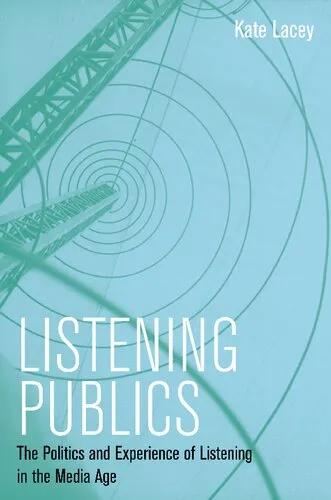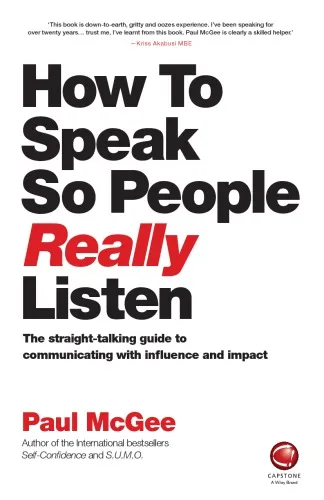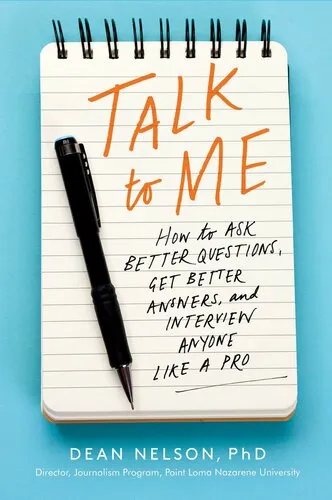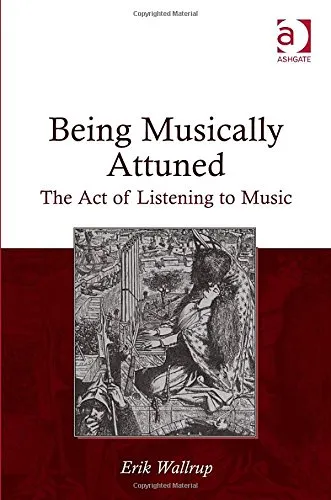Listening Publics: The Politics and Experience of Listening in the Media Age Kate Lacey
4.5
بر اساس نظر کاربران

شما میتونید سوالاتتون در باره کتاب رو از هوش مصنوعیش بعد از ورود بپرسید
هر دانلود یا پرسش از هوش مصنوعی 2 امتیاز لازم دارد، برای بدست آوردن امتیاز رایگان، به صفحه ی راهنمای امتیازات سر بزنید و یک سری کار ارزشمند انجام بدینکتاب های مرتبط:
معرفی کتاب «Listening Publics: The Politics and Experience of Listening in the Media Age»
کتاب «Listening Publics: The Politics and Experience of Listening in the Media Age» نوشتهی کیت لیسی یکی از منابع تأثیرگذار در مطالعات رسانه و فرهنگ است که رویکردی نوآورانه به موضوع شنیدن در عصر ارتباطات رسانهای ارائه میدهد. این کتاب با بررسی سیاستها، تجارب و تحولات شنیداری در دوران دیجیتال، جایگاه مهم شنیدن را در میان دیگر فعالیتهای ارتباطی مانند صحبت کردن و نوشتن بازتعریف میکند.
لیسی در این کتاب سعی دارد نشان دهد که چگونه نوع نگاه به شنیدن میتواند پایههای جدیدی برای نظریههای رسانه و فضای عمومی بنا کند. او از رویکردهای میانرشتهای بهره میگیرد و به مسائلی همچون سیاست شنیدن، تجربه اجتماعی شنیدن، و نقش شنیدن در فضای عمومی مدرن میپردازد. این کتاب نه تنها به خوانندگان و پژوهشگران رسانه بلکه به علاقهمندان به علوم اجتماعی، سیاست و فلسفه پیشنهاد میشود.
خلاصهای از کتاب
کیت لیسی در «Listening Publics» به بررسی عمیق و جامع اهمیت گوش دادن و شنیدن در جوامع معاصر پرداخته است. او نشان میدهد که چگونه فرآیند شنیدن به طور تاریخی نسبت به فعالیتهای دیگر مثل صحبت کردن و نوشتن کمتر مورد توجه بوده است. لیسی بیان میکند که در عصر ارتباطات دیجیتال، شنیدن نه تنها تجربهای انفعالی نیست، بلکه کنشی فعال و تعیینکننده است که میتواند به شکلدهی فضای عمومی و مشارکتهای سیاسی کمک کند.
این کتاب با تکیه بر تحلیلهای تاریخی، فلسفی و اجتماعی، موضوعاتی مانند شنیدن در رسانههای جمعی و شنیدن در روابط بینفردی را بررسی میکند. لیسی همچنین به بررسی نقش شنیدن در سیاست قدرت، عادات شنیداری در فرهنگ عامه، و نحوه تأثیر رسانههای دیجیتال بر شیوههای شنیدن افراد و گروهها میپردازد. او نشان میدهد که چگونه فناوریهای جدید همچون پادکستها، رادیو اینترنتی و رسانههای دیجیتال، تجربه شنیداری را بازتعریف کردهاند.
نکات کلیدی کتاب
- تأکید بر شنیدن به عنوان یک کنش فعال و نه صرفاً انفعالی.
- بازاندیشی در مورد اهمیت شنیدن در نظریههای رسانه و فرهنگ.
- تحلیل تأثیرات فناوریهای جدید بر عادات شنیداری کاربران در رسانههای دیجیتال.
- بررسی سیاست و بعد اجتماعی شنیدن در فضای عمومی مدرن.
- ادغام میانرشتهای از روشهای علمی برای تحلیل روندهای شنیداری.
جملات معروف از کتاب
"Listening is not just about passivity; it is an active engagement with the world and others."
"The politics of listening challenge us to reconsider how power operates in the seemingly neutral act of hearing."
"To listen is to be open to the voices of others and to the demands made by those voices."
چرا این کتاب اهمیت دارد؟
در جهانی که اطلاعات به سرعت انتشار مییابد و صداهای متعدد در فضای عمومی به گوش میرسد، توجه به عمل شنیدن اهمیت ویژهای پیدا میکند. کیت لیسی با این کتاب نشان میدهد که چگونه گوش دادن میتواند ابزاری برای مشارکت مدنی، مقاومت سیاسی و بازتعریف روابط اجتماعی باشد. این کتاب به طور خاص برای درک بهتر ارتباطات در عصر دیجیتال مفید است و فرصتی را برای بازاندیشی در مورد عادات و رفتارهای شنیداری افراد فراهم میآورد.
علاوه بر این، «Listening Publics» دریچهای تازه به روی مطالعات رسانه و فرهنگ باز میکند، زیرا به جای تمرکز صرف بر کنشهای تولید اطلاعات، بر کنشهای دریافت آن تأکید میکند که در ادبیات رسانهای کمتر به آنها پرداخته شده است. این کتاب نه تنها چشماندازهای جدیدی را برای پژوهشگران علوم اجتماعی و رسانه باز میکند بلکه به تمامی کسانی که به دنبال درک عمیقتری از نقش رسانه در زندگی روزمره هستند توصیه میشود.
Introduction to 'Listening Publics: The Politics and Experience of Listening in the Media Age'
In today's media-saturated world, communication is often seen as inherently synonymous with speaking, broadcasting, or forwarding information. However, an equally critical yet undertheorized component of communication is listening. My book, Listening Publics: The Politics and Experience of Listening in the Media Age, seeks to put listening back at the center of the conversation about media, politics, and the public sphere. Written at the intersection of media studies, political theory, and cultural criticism, the book shifts our focus to the act of listening—not merely as a passive, receptive process but as an active, political one that plays a profound role in shaping democracy, public discourse, and social relationships.
The book delves into the ways in which listening has been marginalized in media scholarship and popular discourse. By interrogating its complexities, I argue that listening is not just the "other side" of speaking but a distinct form of participation and agency within public life. From radio to digital media, this book explores how listening has been shaped, disciplined, and politicized in diverse historical and cultural contexts. Ultimately, the study positions listening as a critical yet overlooked dimension of civic engagement and power in the media age.
Summary of the Book
Listening Publics revolves around the core argument that the act and politics of listening deserve as much scholarly and societal attention as the acts of speaking and broadcasting. The book unpacks what it means to be a “listening public” in various media epochs, ranging from the rise of radio broadcasting to the digital age. With each chapter, I confront key questions: How do media technologies influence the ways we listen? How is listening connected to power, participation, and citizenship? And how can listening be reclaimed as a form of democratic engagement?
The book draws on a rich array of examples—radio programming, political speeches, podcasts, and social media—to elucidate how different historical and technological contexts have enabled or hindered listening practices. Special attention is given to the dynamics of inclusion and exclusion, exploring who gets to speak and who is compelled to listen under various circumstances. Furthermore, the book challenges the traditional binary of “active speaker” versus “passive listener,” advocating for a view of listening as an active, critical, and creative practice.
By integrating theoretical frameworks from media studies and political philosophy with empirical examples from everyday life, Listening Publics argues that listening is more than a democratic ideal. It is a practice that must be nurtured and protected. If we are to foster healthier public spheres, we must address the inequalities and blind spots surrounding listening in our media landscapes.
Key Takeaways
- Listening is an active and political process, not merely a passive act.
- The media shape not only how we speak but how we listen, influencing the public sphere and democratic engagement.
- The concept of "listening publics" challenges traditional notions of audience passivity in mass communication.
- Understanding the politics of listening is essential for addressing inequalities in who gets to be heard and who is ignored.
- Listening can be a form of civic participation and resistance in times of political or media crises.
Famous Quotes from the Book
"Listening is not a neutral act. It is, inherently, a politics of attention and recognition."
"In a world dominated by speaking, what does it mean to give space to listening as an act of agency and engagement?"
"The capacity to listen—or be listened to—shapes our roles as citizens, as audiences, and as humans."
Why This Book Matters
Listening Publics addresses a critical gap in media and communication scholarship by highlighting the neglected yet crucial act of listening. In an era where divisive rhetoric, echo chambers, and polarized public discourse dominate, understanding the political and social dimensions of listening is more important than ever. By reimagining listening as a dynamic and participatory process, the book equips readers with the tools to engage more ethically and responsively in both media and civic life.
Furthermore, the book resonates beyond academia, offering insights for media practitioners, activists, politicians, and ordinary citizens seeking to navigate the complexities of communication in our media age. It reminds us that democracy is not just about speaking louder; it is also about listening better—and ensuring others can be heard.
دانلود رایگان مستقیم
شما میتونید سوالاتتون در باره کتاب رو از هوش مصنوعیش بعد از ورود بپرسید
دسترسی به کتابها از طریق پلتفرمهای قانونی و کتابخانههای عمومی نه تنها از حقوق نویسندگان و ناشران حمایت میکند، بلکه به پایداری فرهنگ کتابخوانی نیز کمک میرساند. پیش از دانلود، لحظهای به بررسی این گزینهها فکر کنید.
این کتاب رو در پلتفرم های دیگه ببینید
WorldCat به شما کمک میکنه تا کتاب ها رو در کتابخانه های سراسر دنیا پیدا کنید
امتیازها، نظرات تخصصی و صحبت ها درباره کتاب را در Goodreads ببینید
کتابهای کمیاب یا دست دوم را در AbeBooks پیدا کنید و بخرید
1387
بازدید4.5
امتیاز0
نظر98%
رضایتنظرات:
4.5
بر اساس 0 نظر کاربران
Questions & Answers
Ask questions about this book or help others by answering
No questions yet. Be the first to ask!














